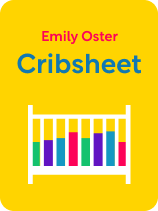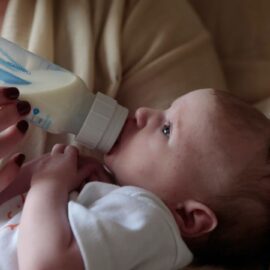

This article is an excerpt from the Shortform book guide to "Cribsheet" by Emily Oster. Shortform has the world's best summaries and analyses of books you should be reading.
Like this article? Sign up for a free trial here.
Looking for an overview of Emily Oster’s Cribsheet book? What is her main parenting advice?
In Cribsheet, Emily Oster gives advice on making research-based parenting decisions. The perspective she takes in the book is unique from traditional parenting advice because she argues that there isn’t a single right way to parent a young child.
Read on for an overview and the key takeaways from Oster’s Cribsheet book.
Cribsheet Book Overview
Will breastfeeding your baby raise their IQ? When should you start potty training your toddler? Parents of young children often ask questions like these, as they’re eager to know the right way to parent. However, Emily Oster argues in her book Cribsheet that there isn’t just one right way to parent a young child. Every family has different goals and situations, so what’s best for one family isn’t always best for another. Oster argues that you can discover the best parenting decisions for your family by consulting research and applying strategies from economics to your decision-making process. In her book, she shares advice on making research-based parenting decisions.
Oster, a mother of two and a professor at Brown University, specializes in health economics. Cribsheet is the second book in her ParentData series, which also includes Expecting Better. Both books focus on ways data can inform your parenting decisions. Oster’s findings in Cribsheet are relevant for any parents of young children and soon-to-be parents seeking advice on making research-informed, less stressful parenting decisions.
The Problem: Parenting Decisions Are Overwhelming
Oster claims that decisions around parenting are often overwhelming because you must navigate moral judgments, contradictory advice, and confusing data. Parents encounter these challenges when seeking advice from people they know (such as doctors, family, and friends) as well as seeking advice online or in books. In this section, we’ll further explore these three challenges.
(Shortform note: The majority of parents turn to the Internet for information to guide their parenting decisions, and research reveals that much of this information is unreliable. For instance, one study that examined online information on caring for preterm infants found that less than half of websites offered trustworthy advice. Health experts who are concerned about the low quality of online parenting advice urge parents to avoid relying on search engine results and instead rely on these two types of online resources: 1) virtual care visits with your child’s doctor; and 2) websites run by physicians.)
According to Cribsheet, people tend to have strong opinions about which parenting choices make you a good parent, and they harshly judge those who decide differently. In the book, Oster surmises that many people attach moral judgments to their opinions to convince themselves that the parenting decisions they made in the past were correct.
(Shortform note: People’s moral judgments about others’ parenting decisions aren’t always based on evidence of those decisions’ actual risks—sometimes, they’re just based on misguided assumptions. For instance, one study found that people harshly judge parents who leave their children unsupervised, even though child abductions are extremely rare. Stories of child abductions receive a disproportionate amount of media coverage, giving people the impression that they’re common. Therefore, people think parents who leave their children unsupervised are neglectful. This judgment can lead to the criminalization of single parents and poor parents, as they’re more likely to leave their children unsupervised out of necessity.)
The Solution: Make Decisions Using Economic Reasoning
In Cribsheet, the book presents the argument that the best way to overcome the stress of parenting decisions is to apply wisdom from economics to your choices. Economics includes the study of how people make decisions under constraints. Ideas from this field, which we’ll call economic reasoning, improve your parenting decisions in two ways.
First, economic reasoning helps you determine how to make a decision, rather than what to decide. This assists you in making a decision that’s best for your situation, instead of what’s best for other people’s situations.
(Shortform note: According to the advice in the Cribsheet book, to make a decision that’s best for you, even if it’s not what others have decided, may be easier to follow in some cultures than in others. Cultures exist on a spectrum from having “tight” social norms to having “loose” social norms. If you live in a “tight” culture, such as Germany or Pakistan, people expect you to conform to social norms. In these countries, you may feel less comfortable taking an unconventional parenting approach. By contrast, if you live in a “loose” culture, such as Brazil or New Zealand, it’s more common and acceptable to deviate from social norms.)
Second, economic reasoning helps you better interpret data so you can feel more confident you’ve made an informed decision. Data clarify many of the risks and benefits associated with different parenting decisions, and economic reasoning helps you weigh these risks and benefits in the context of your life. This process can leave you feeling confident that you’re making a thoughtful, well-informed decision.
(Shortform note: You’ll likely feel even more confident in your parenting decisions if you try to counteract your confirmation bias while encountering data. As Dan and Chip Heath explain in Decisive, confirmation bias is our tendency to seek out and favor information that supports our existing beliefs. The Heaths claim that you can counteract this bias by seeking out information that contradicts your beliefs. For instance, imagine you’re deciding whether to allow visitors to see your newborn. You believe that this could make your infant sick by exposing them to germs. To counteract your confirmation bias, seek out research that supports the opposite conclusion: that exposing your newborn to germs increases their immunity to sickness.)
Gather Actionable Data
According to Oster’s Cribsheet book, you should base your parenting decisions on actionable data: data that reveal which actions cause which outcomes. Here, we’ll explore why data from randomized trials are more actionable, and therefore more useful, than data from observational studies.
The Most Actionable Type of Study: Randomized Trials
Oster argues that you should base your parenting decisions on data from randomized trials because these studies’ data reveal causality. Randomized trials are a type of experiment in which researchers first randomly sort test subjects into groups. Then, they select one of those groups to experience the variable under study. This process ensures that there are no differences between the groups other than that variable. Therefore, researchers can conclude that any difference in the groups’ outcomes results from the variable studied. This reveals causality. As previously noted, studies that demonstrate causality are more actionable.
(Shortform note: Even research that does show causality may not necessarily be actionable for every family. The identities of research participants don’t always mirror the identities of parents who consult that research. For example, transgender parents are underrepresented in research on parenting, and research on cisgender parents may not necessarily feel actionable to them: A randomized trial on cisgender parents’ milk supply likely won’t include data on how testosterone hormone therapy impacts milk production. In cases like these, transgender parents can still seek information by asking their doctor for help applying studies’ results to their situation or by joining a community support group.)
A Less Actionable Type of Study: Observational Studies
According to Oster’s Cribsheet book, you should limit how much you base your parenting decisions on data from observational studies because they don’t reveal causality. These types of studies, which make up the majority of research on parenting decisions, compare groups of people without experimenting on them. Observational studies reveal correlations: evidence that two variables are related. Because they don’t involve an experiment, researchers can’t conclude whether outcomes result from parents’ actions or from other differences in their lives. Therefore, these studies don’t provide evidence of causality. This makes them less actionable.
(Shortform note: What if the only data available on the topic you’re researching are from observational studies? In this situation, it’s still better to rely on observational data over anecdotes. When someone you know or someone online shares information about their parenting decision, it’s an anecdote. Observational studies are more likely to provide a balanced viewpoint compared to anecdotal evidence: Whereas information from anecdotes tends to represent only one individual’s perspective, observational studies tend to reflect the outcomes for multiple participants or the average of the outcomes those participants experienced.)
An Example Comparing Randomized Trials and Observational Studies
Let’s use an example to illustrate the differences between these two types of studies. Imagine researchers are studying whether young children who live with a furry pet are less likely to later develop a pet allergy. They find 100 pregnant parents who are willing to participate in the study.
Example of a randomized trial: Researchers randomly split these 100 parents into two groups of 50 parents. The researchers give each set of parents in one group a cat and ask the other group to promise they won’t adopt a cat. Because this assignment was random, the only difference between these two groups is whether they have a cat.
Ten years later, the researchers test whether these parents’ children have cat allergies. They find that 10% of the children who grew up with cats are allergic, whereas 20% of the children who didn’t grow up with cats are allergic. Because owning a cat versus not owning a cat was the only difference between these children’s families, these results indicate causality. Exposing your child to a cat causes them to be less allergic to cats later in life. Therefore, the study’s data are actionable.
Example of an observational study: Researchers test the 10-year-olds of 100 parents to see if they’re allergic to cats. They also gather data on which children grew up with a cat. Like the other researchers, these researchers find that children who grew up with cats are less likely to have a cat allergy later in life.
However, these two groups of children could have other differences that explain this outcome. For instance, perhaps families who adopt cats tend to be vegetarians. Do children who grow up with cats have fewer allergies to cats because they grew up with them, or because something about being vegetarian reduces your chance of developing a cat allergy? Therefore, the results of this study are less actionable. They indicate a correlation, not causation.
| How to Tell if a Study Is a Reliable, Randomized Trial If you’re searching for actionable data to inform your parenting decisions, how can you tell if a study is a randomized trial, and what are some indicators that it’s a reliable study? To identify a randomized trial, look out for language (usually near the study’s introduction) suggesting that the researchers randomly assigned participants to either an experimental group or a control group. This indicates that the trial is an experiment (rather than an observational study) and that the researchers tried to make the variable under study the only difference between the groups they studied. To determine if a randomized trial is reliable, look for evidence that the researchers tried to prevent bias from influencing the study’s results. These studies are often called “single-blind” or “double-blind” studies. In “single-blind” studies, participants are unaware of whether they’re part of the experimental group or the control group. In “double-blind studies,” both the participants and researchers are unaware of which group is which. |

———End of Preview———
Like what you just read? Read the rest of the world's best book summary and analysis of Emily Oster's "Cribsheet" at Shortform.
Here's what you'll find in our full Cribsheet summary:
- Why there isn't one right way to parent a young child
- How to make research-based parenting decisions
- When you should start potty training your toddler






